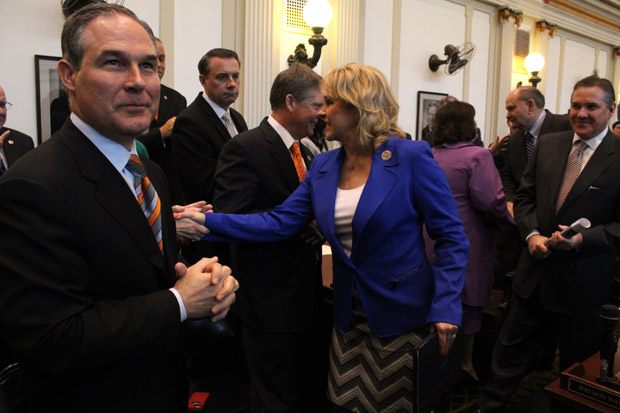
Oklahoma Attorney General Scott Pruitt prepares to greet Gov. Mary Fallin at the 2013 State of the State address at the state capitol.
Joe Wertz / StateImpact Oklahoma


Oklahoma Attorney General Scott Pruitt prepares to greet Gov. Mary Fallin at the 2013 State of the State address at the state capitol.
Joe Wertz / StateImpact Oklahoma

Joe Wertz / StateImpact Oklahoma
Oklahoma Attorney General Scott Pruitt prepares to greet Gov. Mary Fallin at the 2013 State of the State address at the state capitol.
Oklahoma Attorney General Scott Pruitt is at war with the U.S. Environmental Protection Agency, which he says is overstepping its authority. He’s sued the federal agency and testified to Congress about its abuses.
The most visible battles have been over coal regulation, but the fight is about power — not power plants.
The EPA in September proposed new rules limiting the amount of carbon that future coal and natural gas-fired power plants can emit into the atmosphere. The rules were the administration’s first major environmental action since President Barack Obama outlined his new climate change policy in a June speech at Georgetown University.
The energy industry will almost certainly challenge the EPA’s rules in court. And if he gets a chance, Oklahoma Attorney General Scott Pruitt will likely challenge them, too. Oklahoma’s lawyer-in-chief has been at odds with the EPA since he took office in 2011.
“Some believe that we don’t need an EPA, that they don’t have any role at all,” Pruitt tells StateImpact. I’m not one of those folks. I think the EPA can serve — and has served, historically — a very valuable purpose.”
But Oklahoma’s Attorney General says the EPA is no longer serving that purpose — its historical mission to protect human health and preserve the environment. Pruitt says today, the EPA is writing and enforcing rules to pick winners and losers in the energy industry.
Right now, coal is the biggest target in the EPA’s crosshairs. Oklahoma electric utilities depend on coal to fuel their power plants, but Oklahoma is not a major coal producer like Wyoming or West Virginia. But Pruitt says natural gas — a big energy commodity in Oklahoma — is on the federal agency’s hit list, too.
“I think that the progression from coal to natural gas is rather small,” Pruitt says. “I think the attitude with the EPA is that fossil fuels are bad — period. And they’re doing everything they can to use the rule-making process to attack both.”
Attorney General Pruitt has fought the EPA’s crackdown on coal-fired power plants. When the federal agency denied the state’s plan to control coal haze in the Wichita Mountains Wildlife Refuge in favor of a stricter federal plan, Pruitt sued. That case was dismissed in 2012, but Pruitt is still fighting. Right now he’s asking the 10th Circuit Court of Appeals to reconsider a recent 2-1 decision that favored the EPA’s pollution plan over Oklahoma’s.
“The EPA didn’t like our plan for one reason: It contained fossil fuels. And it didn’t’ get rid of them as quick as it wanted it to occur,” Pruitt says.
In June 2012, Pruitt testified to the United States House Committee on Oversight and Government Reform about the EPA’s heavy-handed overreach. He’s signed his name next to other states battling the federal agency, and lead a multistate lawsuit for government records that might show the EPA circumventing states and colluding with environmental groups to set environmental policy through lawsuits, a tactic known as “sue and settle.”
“This is all about cap and trade. It’s all about curbing emissions,” Pruitt says. “It’s all about greenhouse gasses. And I think that’s going to trump and kind of swallow up all these other areas that we’re dealing with now. These other areas have been battles — that’s going to be a war.”
That war could be fought in the nation’s biggest legal arena, Pruitt says. The questions in Oklahoma’s regional haze case deal with cooperative federalism — how state and federal governments are supposed to work together — and the Oklahoma Attorney General says there’s a chance the U.S. Supreme Court might have to weigh in.